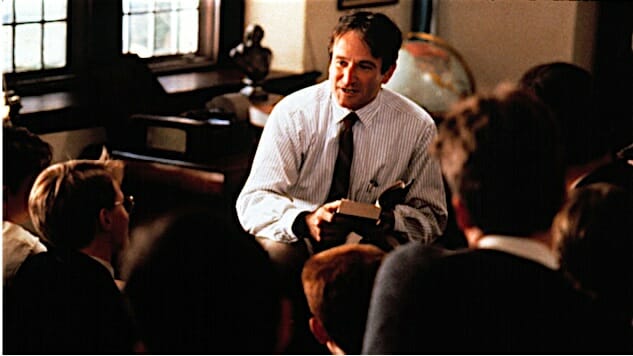Twenty-Five Years after Dead Poets Society
Feeling too much, seizing the day, and remembering the important stuff

I have little to contribute to the deluge of commentary and elegy for Robin Williams, but I’ve been revisiting a lot of the films and TV and books and music and performers that influenced me as a teenager. So I’m going to add a poet’s perspective on Romanticism, depression, Letting the Day Seize You, and one of my two favorite performances of Williams’ extensive, storied, really rather amazing career.
This article isn’t about Robin Williams. Not really.
It’s about unleashing your inner Romantic and living with passion. It hurts and it’s scary to be fully alive, and that’s why most people avoid it. You avoid it. I avoid it. (Sometimes, anyway.)
I believe people seeking help for suicidal ideation should have access to it. They absolutely should. That doesn’t mean I think every suicide is an act of mental illness, or even a tragedy. It’s just not that simple. There are people who are not psychotic, who are completely lucid, who are not going through a “phase,” who for reasons you might or might not understand do not want to live. People who desperately want to live are taken apart every day by things like cancer and poverty and violence. It’s not as simple as “depression is a disease and we can cure it.” And the tang of judgment and indictment around suicide (“Selfish.” “Weak.” “Crazy.” “Couldn’t ask for help.” “Senseless.” “Should have seen to it that it didn’t.”) is beyond unhelpful.
I learned this from the Big Crazy Obsessive teen love of my life, who made his final curtain call almost a quarter century ago, coincidentally a few months after Robert Sean Leonard played the brilliant, sparkling young thing who was bursting with potential and destined for the same appointment with the business end of a firearm in Peter Weir’s Dead Poets Society.
The Maverick Mentor Who Changes Everything is a cinematic supertrope for a reason. It’s real. Many of us have had that teacher, and those who haven’t have missed a transcendent experience. In this case, the sorcerer is a rogue literature teacher named John “Keats” (ha ha) Keating, who has returned, in 1959, to his alma mater, an ultra-stodgy elite boys’ boarding school. His mission is to teach poetry to what must be the most poetry-resistant demographic on earth: adolescent males. And since there are no spoiler alerts on 25-year-old films, let me just say he succeeds.
It is an extraordinary performance by Williams. It harnessed his classic manic cokey verbal machine-gun-volleys and hilarious impersonations—restraining that impulse with the very control his character was urging his students to shake off. Granted, Williams had a long walk from the other end of the silent conformity spectrum, and Weir found the part of him that was quietly passionate and full of empathy (Gus Van Zant would find it again when Williams played Matt Damon’s shrink in Good Will Hunting) without descending to schmaltz. (Sentimentality was achieved a couple of times, but hey, sentiment is feeling, and that is what I am talking about.)
As John Keating, Williams exhorted his students to emulate Thoreau and “suck the marrow out of life.” He shook them up, demanding that they look at their ordinary environment from different perspectives (from the tops of their desks, for example) as he fed them Walt Whitman and Shelley and the Transcendentalists.
-

-

-

-

-

-

-

-

-

-

-

-

-

-

-

-

-

-

-

-

-

-

-

-

-

-

-

-

-

-

-

-

-

-

-

-

-

-

-

-








































